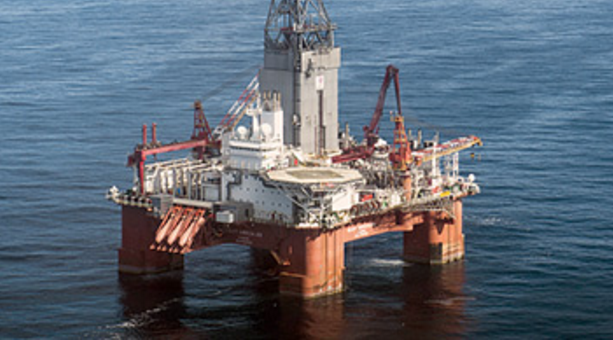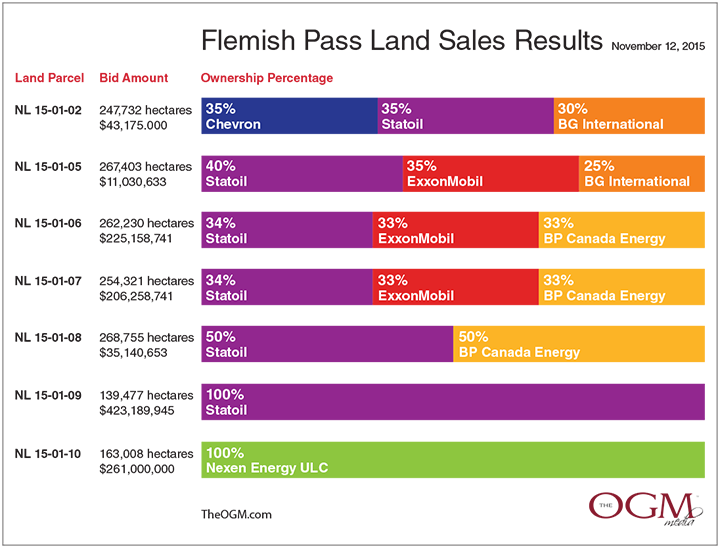Our 25th Anniversary Edition - Read Now!
View Past IssuesAfter 19 months of focus and dedication, Statoil has completed the next phase of their exploration drilling campaign offshore Newfoundland.
According to Statoil representatives, “The purpose of the drilling program was to increase the robustness of the Bay du Nord project and to test new areas of the Flemish Pass Basin.
Nine wells were drilled safely and efficiently by the Seadrill West Hercules in the Flemish Pass Basin, located approximately 500 kilometers east of St. John’s, Newfoundland and Labrador.
The results have improved Statoil’s understanding of the frontier Flemish Pass Basin. The drilling program included four exploration wells in close vicinity of the 2013 Bay du Nord discovery, as well as three appraisal wells on the discovery. In addition, two exploration wells were drilled in areas outside the Bay du Nord discovery. While the drilling program took place in the very harsh offshore environment of the Flemish Pass Basin, a testament to the strong operational and HSE performance, the team set several records on drilling speed during the campaign.

The West Hercules semisubmersible drill rig successfully drilled nine wells for Statoil in the last 19 months. Recoverable oil has been found at two of the sites.
Statoil’s update on the projects says, “The drilling program has resulted in two discoveries of oil at the Bay de Verde and Baccalieu prospects in the Bay du Nord area, both of which add to the resource base for a potential development at the Bay du Nord discovery. The appraisal and near-field exploration of the Bay du Nord discovery have reduced key reservoir uncertainties and confirmed that the volumes are within the original volume range of the 300 to 600 million barrels of recoverable oil initially estimated by Statoil in 2013″, says Erling Vagnes, senior vice president, Statoil Exploration.
“We are encouraged by the discoveries in the Bay de Verde and Baccalieu wells and the results of the appraisal wells,” said Erling Vågnes, senior vice president, Statoil Exploration, Northern Hemisphere. “Based on the improved understanding of the Flemish Pass Basin petroleum system, we are maturing further prospects that may add volumes to Bay du Nord.”
“The Flemish Pass Basin offshore Newfoundland is a frontier area, where only 17 wells have been drilled in the entire basin – in an area that is 30,000 km2,”said Vågnes. “This drilling campaign has been critical both to maturing the Bay du Nord discovery as well as evolving our knowledge of the greater basin and Newfoundland offshore – which remains a core exploration area for Statoil.”

The drilling program began in November 2014 and was extended by one month to incorporate the drilling of Baccalieu, a well on a license awarded by the C-NLOPB in the 2015 land sale, which Statoil was able to progress from access to well-completion in four months.
Statoil’s assessment of the commercial potential of the Bay du Nord discovery is ongoing. “The recent drilling program has been critical to Statoil’s continued assessment of Bay du Nord, and work is underway to evaluate the results related to proceeding with a potential Statoil-operated development in the Flemish Pass Basin,” said Paul Fulton, president, Statoil Canada.
Exploration and development of the mega projects offshore Newfoundland result in $billions, in expenditures. From exploration to delineation these mega projects depending on the method of extraction (GBS or FPSO) could require spending thresholds of anywhere from 3-7 $billion for the construction phase of a GBS alone. For example, the Hibernia GBS was a 5.2 $billion construction project and that was almost two decades ago. All of this adds up to good news for the companies in the oil and gas sector that serve the offshore and it benefits the people of the province in royalties, spinoffs and other immeasurable and intangible ways.
We are excited about this good news!
_____________________________________________________________________

Tina Olivero
Fill out this request and we will have a product & service expert get in touch with you.
Did you enjoy this article?